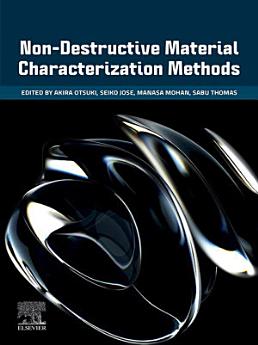Non-Destructive Material Characterization Methods
About this ebook
About the author
Dr. Akira Otsuki is a Visiting Professor at Luleå University of Technology, and the Unit coordinator and leading professor of the unit “Mine Tailings at Universidad Adolfo Ibáñez. He is a member of several academic societies as well as an editor of academic journals including ChemEngineering and Recycling. He also serves as a guest editor of special issues, including “Colloidal/Fine Particle Aspects of Mine Tailings. His research focuses on characterization and processing of complex materials, including waste materials, natural ores, and colloids. He has been developing and running national and international research projects on his research focuses.
Seiko Jose PhD is a scientist, working at ICAR-Central Sheep and Wool Research Institute, Avikanagar, Rajasthan, India. He has over 17 years’ experience in textiles including time spent in industry and academia. His industrial experience is focused on wet processing of cotton, silk, and linen processing units. For the last 8 eight years of his research career, he has worked with a range of natural fibres such as, wool, jute, pineapple leaf fibre, coir, flax, and ramie. He has contributed to 30 research papers and 9 book chapters. His major research areas are extraction and characterization of natural fibre, textile dyeing and finishing, eco-friendly textile processing, natural fibre composites, and natural dyes.
Dr. Manasa Mohan A. graduated in 2010 from University of Kerala, India, completing post-graduation with first rank from the Department of Chemistry, and also received a gold medal in chemistry from the University of Kerala. She completed her PhD in polymer-based drug delivery systems in 2018. She is now working as a Kothari postdoctoral fellow in Mahathma Gandhi University, Kottayam, Kerala.
Sabu Thomas is the chairman at the Trivandrum Engineering Science and Technology Research Park (TrEST Research Park) and the former vice chancellor at the Mahatma Gandhi University, Kottayam, Kerala, India. He is also the director at the School of Energy Materials, the School of Nanoscience and Nanotechnology, and the International and Inter University Centre for Nanoscience and Nanotechnology. Prof. Thomas is also the former director at the School of Chemical Sciences and the founder of the School of Polymer Science and Technology, Mahatma Gandhi University, Kottayam, Kerala, India. He received his Ph. D. in 1987 in Polymer Engineering from the Indian Institute of Technology (IIT), Kharagpur, India. He has been ranked no.1 in India about the number of publications (most productive scientists). Prof. Thomas’s research group specialized areas of polymers which includes Polymer blends, Fiber filled polymer composites, Particulate-filled polymer composites and their morphological characterization, Ageing and degradation, Pervaporation phenomena, sorption and diffusion, Interpenetrating polymer systems, Recyclability and reuse of waste plastics and rubbers, Elastomer cross-linking, Dual porous nanocomposite scaffolds for tissue engineering, etc. Prof. Thomas’s research group has extensive exchange programs with different industries, research, and academic institutions all over the world and is performing world-class collaborative research in various fields. Professors Centre is equipped with various sophisticated instruments and has established state-of-the-art experimental facilities which cater to the needs of researchers within the country and abroad. His H Index- 133, Google Citations- 86424, Number of Publications- 1300, and Books-160.






